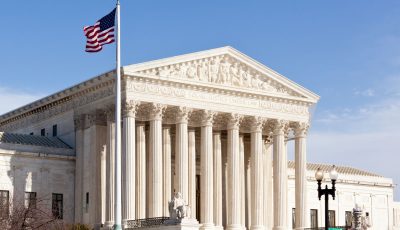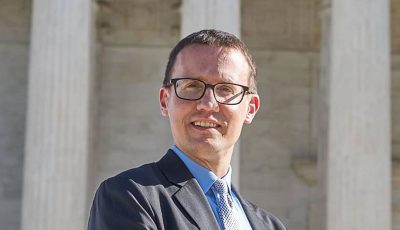Petition vs Insular Cases gets boost from 8 amicus briefs
Prominent scholars, former judges, elected officials, civil rights groups, and more add their voices to overruling the Insular Cases and recognizing a right to citizenship in US territories
Following the lead of Supreme Court justices Neil Gorsuch and Sonia Sotomayor, who in April called on the Supreme Court to overrule the controversial Insular Cases in “an appropriate case,” a politically and ideologically diverse array of “friends of the court” filed eight amicus briefs calling on the high court to take up Fitisemanu v. United States and do just that.
The Biden-Harris Administration and a divided panel of the 10th Circuit have relied on the Insular Cases to deny that the Fourteenth Amendment’s guarantee of birthright citizenship applies to people born in U.S. territories. In April, John Fitisemanu—who is denied recognition as a U.S. citizen by a discriminatory federal law based on his birth in American Samoa—petitioned the U.S. Supreme Court to take up his case, recognize him as a U.S. citizen, and overrule the Insular Cases.
“It is rare these days to see people from different political or ideological backgrounds agreeing on anything. So we are encouraged to see both Republicans and Democrats, conservatives and liberals, come together to support turning the page on the Insular Cases and the colonial framework they established,” said Neil Weare, president and founder of Equally American, which advocates for equality and civil rights for the 3.6 million residents of U.S. territories, 98% of whom are people of color. “These briefs will not just give the Supreme Court a lot to think about, but hopefully the Biden-Harris Administration as well as they consider whether to continue embracing the Supreme Court’s racist decisions in the Insular Cases.”
Current and former territorial officials brief
A bipartisan group of current and former elected officials in Puerto Rico, Guam, the U.S. Virgin Islands, and the Northern Mariana Islands argue that it is time for the Supreme Court to overrule the Insular Cases and recognize that those born in U.S. territories have a constitutional right to be recognized as U.S. citizens. They also address concerns raised by elected officials in American Samoa, demonstrating based on the experiences of each of their territories that recognition of citizenship does not threaten self-determination or the protection of land and culture.
The brief is joined by members of both the Republican and Democratic parties and both of Puerto Rico’s two major parties, the Partido Nuevo Progresista and Partido Popular Democrático. Amici include Delegate Stacey Plaskett (U.S. Virgin Islands), Delegate Michael F.Q. San Nicolas (Guam), former Puerto Rican governors Aníbal Acevedo Vilá and Dr. Pedro Rosselló, former Guam governor Carl T.C. Gutierrez, former Virgin Island governors Kenneth E. Mapp and John de Jongh, former Delegate Donna M. Christian-Christensen (Virgin Islands), former Guam lieutenant governor Kaleo Moylan, vice speaker Tina Rose Muña Barnes (Guam Legislature), Rep. Sheila Jack Babauta (CNMI House of Representatives), and former Senate president of Puerto Rico Eduardo Bhatia. Amici are represented by Covington.
“It is time that the Supreme Court, President Biden, and Congress condemn the Insular Cases as inconsistent with the Constitution and who we are as a nation. This condemnation would be the same condemnation as has been given to several other rulings of that time period which created many race alienating and dehumanizing policies,” said Plaskett, who represents the U.S. Virgin Islands as a non-voting Member of Congress. “In 2022 people born in the U.S. Virgin Islands and other territories should live in perpetuation limbo as to whether Congress could deny them recognition as U.S. citizens.”
“It’s time for the Supreme Court to overrule the Insular Cases and recognize that people born on Guam and other territories have the same right to citizenship as anyone else born on U.S. soil,” said Michael F.Q. as a non-voting Member of Congress.
Citizenship scholars brief
An ideological diverse array of citizenship scholars argue that the Supreme Court should recognize that the Constitution’s guarantee of birthright citizenship extends to people born in U.S. territories, as made clear based on the common law principle of jus soli enshrined in the 14th Amendment.
Amici include professors Sam Erman (USC Law), Michael Ramsey (San Diego Law), Linda S. Bosniak (Rutgers Law), Stella Burch Elias (Iowa Law), Kristin Collins (Boston Law), Christopher R. Green (Mississippi Law), Torrie Hester (St. Louis University), Linda K. Kerber (Iowa), D. Carolina Núñez (BYU Law), Nathan Perl-Rosenthal (USC), Polly J. Price (Emory Law), Lucy E. Salyer (New Hampshire), Rogers M. Smith (Pennsylvania), Katherine R. Unterman (Texas A&M), Charles R. Venator-Santiago (Connecticut), Ryan C. Williams (Boston Law). Amici are represented by Sidley.
“As a matter of original understanding, it is clear that the 14th Amendment guarantees a right to U.S. citizenship to people born in U.S. territories. And it is long past time that the Supreme Court dispel any doubts to the contrary,” said Ramsey, professor of Law at University of San Diego, author of Originalism and Birthright Citizenship published in the Georgetown Law Journal.
Constitutional law and legal history scholars brief
Leading scholars on the Insular Cases from a diverse array of ideological perspectives argue that the Supreme Court should grant review of Fitisemanu in order to overrule the Insular Cases, arguing that those cases “lack[] any basis in the Constitution” and “rest on offensive notions of racial inferiority.”
Amici include law professors Christina Duffy Ponsa-Kraus (Columbia), Gary Lawson (Boston University), Guy-Uriel Emmanuel Charles (Harvard), Rafael Cox Alomar (University of the District of Columbia), Luis Fuentes-Rohwer (Indiana University Bloomington), J. Andrew Kent (Fordham), Sanford Levinson (University of Texas), Stephen I. Vladeck (University of Texas). Amici are represented by WilmerHale.
Descendants of Dred Scott and Isabel Gonzalez brief
Lynn M. Jackson, the great-great-granddaughter of Dred and Harriet Scott, and Belinda Torres-Mary, the great-granddaughter of Isabel Gonzalez, call on the Supreme Court to take up Fitisemanu in order to avoid repeating mistakes of the past. In Dred Scott v. Sandford, the Supreme Court created a judicial exception to the American guarantee of birthright citizenship to deny citizenship to African Americans. In Gonzales v. Williams, the Supreme Court avoided recognizing Puerto Ricans as citizens, enabling the political branches to deny a right to citizenship for those born in U.S. territories. Amici are represented by Hogan Lovells.
“The Supreme Court has the rare opportunity here to correct its mistakes in Dred Scott and Gonzales. Inaction by the Supreme Court now would repeat the errors of those cases and perpetuate the idea that there can be racial limits on U.S. citizenship,” said Neal Katyal, a partner at Hogan Lovells, who represents Jackson and Torres-Mary. Katyal is the former acting solicitor general of the United States under President Barack Obama, and in that role confessed error on behalf of the U.S. Justice Department for its role in the Korematsu and Hirabayashi cases.
Former territorial judges brief
Retired federal and local judges from Puerto Rico, Guam, and the U.S. Virgin Islands argue that the Supreme Court should overrule the Insular Cases because they are “rooted in offensive racial stereotypes” and, based on their experiences, “unworkable in application.” Further, they emphasize that Supreme Court action is needed “to ensure that no judge serving in the territories will ever again be forced to apply a precedent that assumes that he or she belongs to a sub-class deserving of fewer constitutional protections.”
Amici include retired chief justice B.J. Cruz (Supreme Court of Guam), retired chief judge José Fusté (U.S. District Court for the District of Puerto Rico), former judge Soraya Diase Coffelt (U.S. Virgin Islands Superior Court); retired chief judge Héctor Manuel Laffitte (U.S. District Court for the District of Puerto Rico), retired chief justice Liana Fiol Matta (Supreme Court of Puerto Rico), and retired judge Adam G. Christian (U.S. Virgin Islands Superior Court). Amici are represented by Holwell Shuster & Goldberg.
Civil rights brief
A dozen civil rights organizations argue that Fitisemanu “presents a rare opportunity to squarely address the Insular Cases and their deeply problematic ‘territorial incorporation doctrine.’”Amici include the American Civil Liberties Union, ACLU of Utah, Asian American Legal Defense and Education Fund, Autistic Self Advocacy Network, Brennan Center for Justice at NYU School of Law, Dēmos, Human Rights Campaign, Lambda Legal Defense and Education Fund, Inc., LatinoJustice PRLDEF, The Leadership Conference on Civil and Human Rights, OCA–Asian Pacific American Advocates, and Washington Lawyers’ Committee for Civil Rights and Urban Affairs.
“The Insular Cases cannot be reconciled with the text or original understanding of the Constitution and represent a set of racist assumptions about residents of U.S. territories that must be rejected. If the court doesn’t act now to overrule the Insular Cases, it is not clear when it will have another chance,” said Adriel I. Cepeda-Derieux, senior staff attorney at ACLU.
“Justice Sotomayor and Justice Gorsuch are right—the Insular Cases represent a shameful history of racist exclusion that we must forcefully reject as contrary to our basic democratic and constitutional ideals. It’s well past time for the Supreme Court to once and for all put a full stop to continued reliance in federal courts on this wrong-headed precedent that relegates too many to second-class citizenship,” said Lourdes M. Rosado, president and general counsel of LatinoJustice PRLDEF.
Virgin Islands Bar Association brief
The Virgin Islands Bar Association calls on the Supreme Court to overrule the Insular Cases and recognize that all people born in U.S. territories have a right to citizenship that is not dependent on Congress. The brief emphasizes how overruling the Insular Cases would be consistent with principles of stare decisis set forth by the Supreme Court. Amici are represented by KutakRock LLP.
“People born in the U.S. Virgin Islands should not have to worry whether Congress will one day decide to stop recognizing them as U.S. citizens. The only reason this is even a question is because of a series of racist Supreme Court decisions known as the Insular Cases. It is long past time the court overrules these cases.” said Alisha Udhwani, president of the VI Bar Association.
Samoan Federation of America brief
The Samoan Federation of America—one of the oldest Samoan community organizations in the U.S. mainland, and a plaintiff in a similar prior lawsuit—are calling on the Supreme Court to recognize people born in American Samoa as U.S. citizens in order to bring an end to harms American Samoans face as a result of the century-long imposition of non-citizen U.S. national status by the U.S. government. Amici are represented by Orrick.
“As a result of a long history of discrimination by the federal government, American Samoans are citizens of nowhere even as they have the highest rate of military service of any American community. This isn’t just un-American, it’s unconstitutional,” said Michelle Mataese, president of the Samoan Federation.
The Biden-Harris Administration is set to respond to the Fitisemanu petition on June 30, 2022. Members of Congress and prominent civil rights organizations have called on the Biden-Harris Justice Department to condemn the Insular Cases. The U.S. House of Representatives is also considering a House resolution condemning the Insular Cases, holding the first-ever congressional hearing on the Insular Cases last year.
The Supreme Court is expected to consider whether to grant review of Fitisemanu later this year.
More information about Fitisemanu v. United States is available at https://www.equalrightsnow.org/fitisemanu and at the Supreme Court’s website at https://www.supremecourt.gov/search.aspx?filename=/docket/docketfiles/html/public/21-1394.html. (Equally American)



























